
During lockdown mark one, year 5 students at one school were all given a shiny computer to take home to keep up with their teachers who would pop online each morning to convey the day’s lessons.
There were weird hat days, dress up days, maths cluster days, and group online play dates — all delivered into their lounge rooms and home play rooms.
A few kilometres away, at another school, primary school teachers used their own money to photocopy pages and pages of lessons. They then climbed into their own cars and drove from family to family to deliver the curriculum.
The inequity in the education delivered to students is just one prodigious snag in the forest of challenges delivered by COVID-19. There are many others.
Anxiety including school refusal, particularly among teen girls, has reached menacing levels. Young children, given phones to keep in touch with friends during COVID-19, are struggling to communicate with them face-to-face. Some primary school students are handing in drawings with a coronavirus monster knocking at their front door.
NAPLAN might not go ahead because of an agreement between the union and government in one state. The spectre of unemployment and the cancellation of gap year plans means applications for universities next year have jumped by up to 40% in some regions.
But silver linings have popped up too. Kids Helpline has recorded a drop in bullying-related calls. Some students with autism have blossomed away from the packed classroom. Shy students, hesitant to raise their hand in front of two dozen others, have seen a jump in their marks in assessments. And despite the loss of some rites of passage, the delivery of online lessons to students in years 11 and 12 has provided them with both flexibility and easy sleep-ins.
That’s what principals and teachers are telling their school communities, and some individual schools are reshaping lessons and timetables and delivery modes to accommodate changes. But why aren’t we having these discussions at a national level?
The answer is as simple as it is senseless. We don’t value the expertise and experience of those responsible for the education of our children. We don’t seek the advice of principals on the value of NAPLAN, or the mental health challenges facing our children.
We develop policy without their input, use them as scapegoats when it suits, and then wonder why we are on a perpetual chase to match other countries’ education wins.
Perhaps this is another lesson being offered by COVID-19. We are listening to health experts on the most urgent health crisis confronting this generation. The names of our chief health officers and pandemic experts roll off our tongues in debates.
The same goes for those experts able to offer rational explanation of the economic crisis we face. Take the public role of Reserve Bank governor Philip Lowe, for example.
This is a health and economics crisis first, second and third. But that doesn’t mean it won’t become an education crisis too.
Our schools are jam-packed with men and women whose expertise spans decades. Teachers who have watched, over a generation, what makes a leader and what doesn’t.
School counsellors who can change the way a child thinks. Guidance officers who can teach children to grow dreams beyond what they can see. And the principals — those CEOs of our public and private schools — who run budgets into the millions while juggling everything from legal issues around child protection to future-proofing tomorrow’s workers.
So why don’t we seek them out as we plot the future of education in Australia? And why don’t we do it now, as COVID-19 risks disrupting the next year or two of schooling?
Decisions made in schools can and do matter for decades. You don’t need an ATAR to understand that.








I am a teacher. Not one from the shiny computer side of the tracks alas. I have seen my colleagues teaching at school and on line. Ringing parents and kids to check on them. I worked from home marking on line work, but the ones at school had a double workload and spent their break learning on line.(Me too) Now we are faced with no singing, no tables chants etc because of the risks but also no social distancing(???). NIce to be recognised by Crikey, but I’d like to kick Morrison’s shiny arse and Tehan as well. As to counsellors, the ratio in NSW public schools is about 1 counsellor to a thousand kids. Hard to change much there.
It is not just the teachers and principals of schools who are ignored.
Take a look at the changes to university fees being put forward by the federal government – with the original schedule being amended because the huge educational talent of the Nationals party room demanded changes. Then there were the three actions by Treasurer Frydenberg to exclude university staff from access to JobKeeper (though Catholic priests were recipients).
There is no level or aspect of Australian education that escapes political abuse. And there are no politicians, of any party, who know what they are talking about or understand the consequences of their actions. Education is ideologically driven by people without any educational ideals, understanding, experience, insight or knowledge. That’s what happens when a field such as education is privatised and subject to market forces.
But that’s majorly been a ‘(federal) Coalition government’ (18 of the last 25 years) : and this is Madonna King.
Imagine her writing something critical about them specifically – instead of “pollies” generally.
She’s happy to single out “Labor” any other time.
If only all schools were like that….
If there weren’t those where teachers are not valued by “deaf” despotic principals set in their ways, running schools down – where morale and “resources” are run into the ground by a principal that acts like a dictator…. Where teachers are virtually forced to go to another school because they “don’t fit in” with their boss’s charted course.
Where principals are “quietly moved on” as reality is realised.
If only Morrison would have listened to the concerns of teachers with their noses pressed to the coalface of potential exposure to the virus – rather urge overriding their concerns.
If only life was as simple as Murdoch hacks – like Fagan-King – would have us believe they are.
“… rather than urge …” of course.
Imagine how education would benefit if we had a robust, high speed internet linking the nation.
It could e called something like, I dunno, a National Broadband Network.
Like the sort thing which the last PM made his many millions promoting before he entered politics.
Finally – someone has recognised the value of teachers. Thanks!